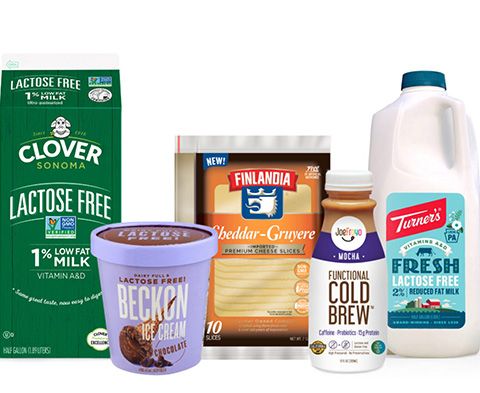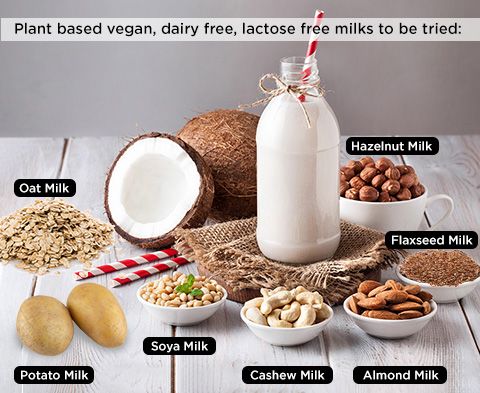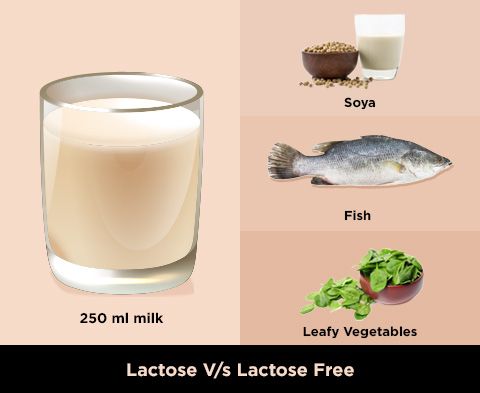What to Eat and What Not to Eat for Lactose Intolerance?
In order to develop Lactose tolerance, start with 30–60 mL milk per day and gradually increase to a maximum of 250 mL milk per day.

Are you stuck with bloated, flatulated, diarrheal, crampy, or gurgly stomach after having milk, cheese, whey, butter, or even dry milk powder?
These are the typical symptoms of Lactose Intolerance. That’s your stomach’s inability to digest lactose, a kind of sugar present specifically in milk and dairy products.
Lactose Intolerance Briefly
Ideally, Lactose should be digested by the lactase enzyme in the intestine. The inability or absence of this enzyme to digest lactose in dairy items can cause a bloated and distressed stomach. In medical terms, this condition is termed Lactose malabsorption or Hypolactasia.
As a result, when this undigested lactose enters the colon, it is fermented by the bacterial flora with consequent production of short-chain fatty acids and gas (hydrogen, carbon dioxide, and methane) that causes colonic irritation followed by secretory watery diarrhea.
The process begins around 1 hr after lactose intake, but it may happen early or late as well.
It can even cause constipation, nausea, and vomiting sometimes. The degree of lactose intolerant depends on the severity of the symptoms.
Is Lactose Intolerance and cow milk allergy similar?
Absolutely not...
The symptoms could be similar to cow's milk allergy and could be wrongly labeled "milk allergy."
But both the conditions are different. 4
The basic difference between Lactose Intolerance and Cow milk allergy:
|
|
|
|
Lactose
Intolerance |
Cow Milk
allergy |
|
Deficiency of lactase enzyme |
Immune-mediated
allergic reaction |
|
Occurs to lactose intake |
Occurs
due to cow milk proteins |
|
May occur after 5-6 yrs of age |
May
occur during 1st yr |
|
Symptoms are gastro-intestinal as mentioned above |
Allergic
reactions including skin rashes, swelling and respiratory allergy |
|
Non- curable |
May
disappear after 2-5 yrs |
|
Prevented with Low lactose diet |
Prevented
with Cow’s milk proteins-free diet |
But How Lactose Intolerance is good?
Interestingly, People with lactose intolerance, due to low consumption of milk and other dairy products, have been reported with decreased risks of lung, breast, and ovarian cancers.2
So, Lactose Intolerance may restrict your dairy consumption but for a good reason.
Preventive and Recommended foods for Lactose Intolerance
|
|
|
|
Foods to avoid |
Foods
to eat |
|
All kinds of milk: whole, low fat, non-fat, cream, powdered, condensed,
evaporated, and goat |
Lactose-free milk, soy milk, curd |
|
Cheesy sauces ,Cheese spread ,cottage cheese, cream cheeses, soft
cheeses (brie, ricotta) and mozzarella |
All fruits and
vegetables |
|
Butter |
All legumes, cereals, meat, fish, and
eggs |
|
Ice cream , whipped Cream |
All vegetable fats |
|
Fish and meat (breaded or creamed) |
Hard Cheese (Parmesan, Pecorino, Grana
Padano, fontina, taleggio, provolone, Swiss) |
|
Milk bread |
|
|
Muffins, biscuits, waffles, pancakes, cake, milk chocolate, bakery
products and desserts. |
|
What’s new for Lactose Intolerance?

A number of lactose-free labeled products can be easily found in grocery stores. You must be an attentive buyer to get the right product.
If you are critically intolerant to lactose, then you should explore the cafes, ice-cream shops, bakeries, and restaurants nearby that offer special menus, with lactose-free products.
Lactose-free protein powders are also top picks for lactose intolerants.
Lactose tablets and drops
These are the supplemental source containing lactase enzyme, commercially available at drug stores and to be taken prior to or simultaneously with the dairy meal to manage stomach discomfort.
Diet with Lactose Intolerance
If you are lactose intolerant then you should settle for only a vegan diet. It is a lactose-free diet.
The dairy products in a vegan diet are derived from plant milk, which is lactose-free.
Therefore absolutely suitable for those who plan to manage their weight by excluding lactose.

Connect to DrTrust360 to get your customized diet plan with lactose-free food options.
“Must Try” remedies for Lactose Intolerance:
1.The gradual introduction of cow milk
If you need to add milk to your diet, start with 30–60 mL per day and gradually increase to a maximum of 250 mL milk per day.
Consume milk with meals rather than on an empty stomach to slow the release of lactose in the small intestine.
Consistency of consumption daily is the key to building tolerance.
Try high-fat milk. It may be better tolerated due to slow transit time.
2. Curd and yogurt for lactose intolerance
Curd and yogurt are the most power-packed food items consumed throughout the world among lactose maldigesters. These are a good source of probiotics and prebiotics, and both offer benefits to gastrointestinal bacteria.
The lactose in curd/yogurt is digested more efficiently than other dairy sources of lactose because the bacteria Lactobacillus Bulgaris and streptococcus thermophiles assist with its digestion.9
3. Try having aged cheese

Aged cheese is generally well tolerated due to its low lactose content (0.1–0.9 g of lactose in 30 g of hard cheese)7
100 grams of cheddar cheese contains only trace amounts of lactose.
4. Other Food sources of calcium
Calcium from green leafy vegetables, dried beans and legumes with additional Vitamin K can replace dairy products in calcium regulation and bone formation.

Did you know?
Depending on only a plant-based diet, it can be challenging for lactose intolerants to achieve adequate daily calcium intake. But calcium supplements in combination with Calcium-rich plants can fulfill your daily calcium needs.10
If you are lactose intolerant, no worries. Dr Trust Calcium tablets will fulfill your body's daily calcium requirements.
